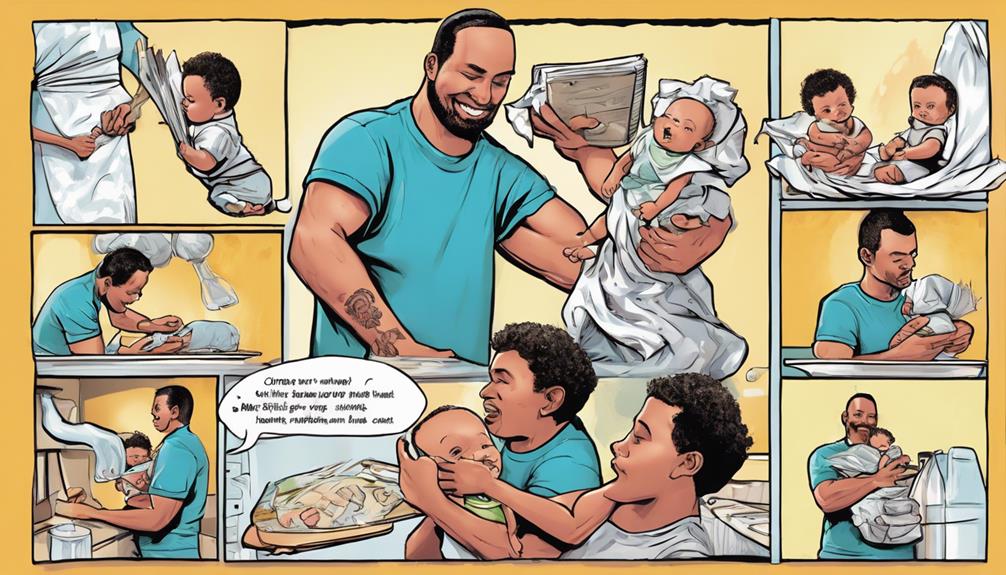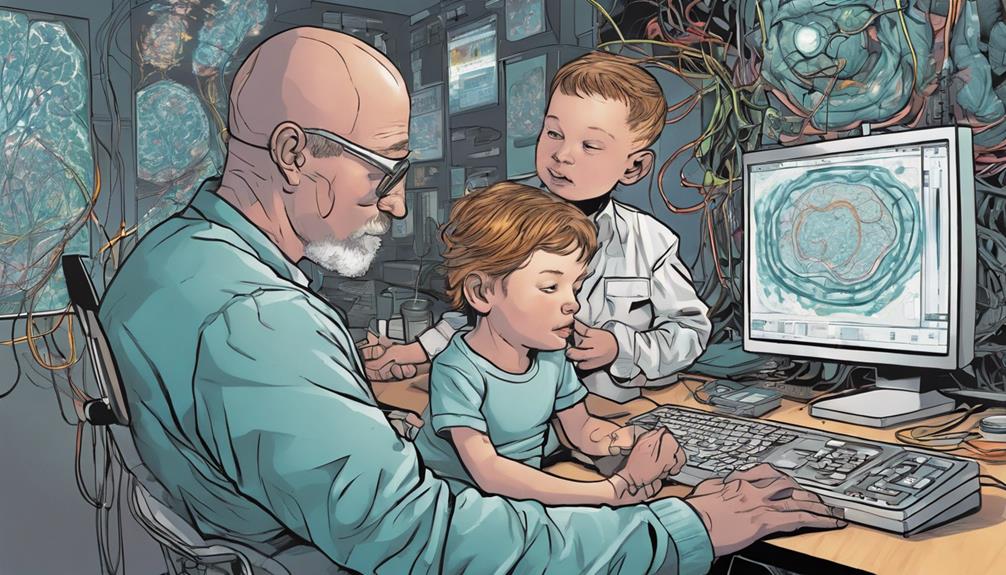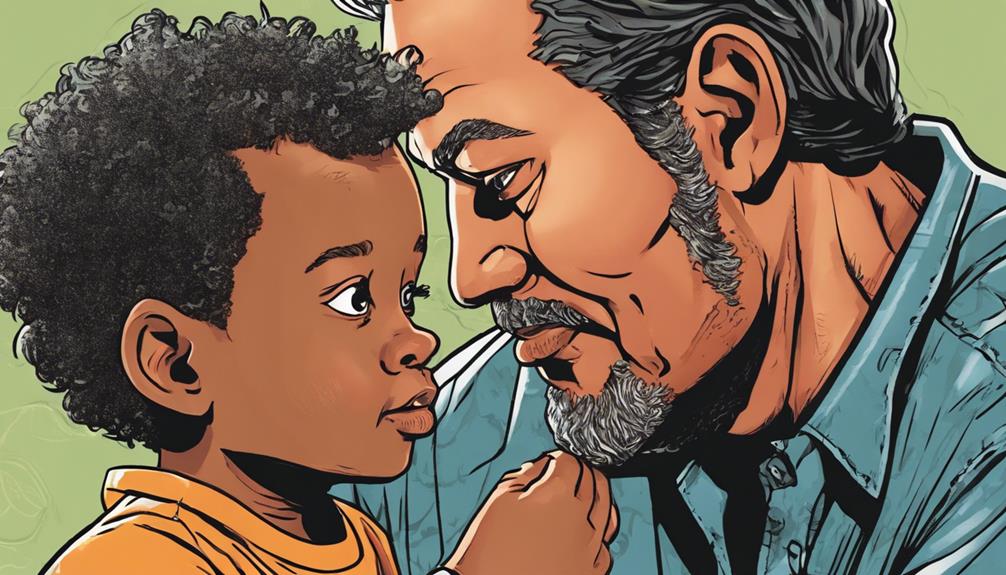Fatherhood is a complex role that influences child development and challenges traditional parenting norms. Fathers face societal misconceptions, often portrayed as incompetent in media. Yet, bonding with fathers is essential, enhancing emotional connections and language skills through interaction. Scientific research underscores fathers' unique contributions, promoting well-being by challenging kids developmentally. Modern fathers are more engaged in childcare, breaking traditional gender roles. Neuroscience reveals that active fathering impacts brain structure, fostering empathy and stress regulation. This brief overview merely scratches the surface of the intricate world of fatherhood.
Key Takeaways
- Fathers' unique contributions shape children's well-being.
- Neuroscience shows fatherhood impacts brain structure and hormones.
- Evolution in parenting recognizes fathers' critical role.
- Increased paternal involvement benefits child development.
- Modern fatherhood dynamics reflect changing societal expectations.
Societal Misconceptions and Fatherhood
Society's portrayal of fatherhood often perpetuates misconceptions and stereotypes, particularly through media and popular culture. Fathers are commonly depicted as bumbling or disengaged parents, reinforcing the 'deadbeat dad' stereotype despite many being dedicated caregivers.
Advertisements and sitcoms frequently showcase dads as incompetent for comedic effect, perpetuating the unfair treatment of fathers compared to mothers. This portrayal can influence public perception and impact fathers' confidence in their parenting abilities.
While some dads may take longer to bond with their children compared to mothers, it is vital to recognize that fatherhood is a multifaceted role with unique contributions. Challenging these stereotypes and highlighting the value of involved fatherhood is essential for promoting positive parenting practices.
Bonding and Unique Contributions

Perceptions of fatherhood have evolved to emphasize the importance of bonding and the unique contributions fathers bring to their children's development. While instant bonding with a newborn may not always occur, the bond strengthens over time through interactions and engagement.
Fathers play a pivotal role in challenging children developmentally and fostering strong emotional connections through play. Modern fatherhood is characterized by increased involvement in parenting, with dads contributing significantly to their child's language development, social behavior, and emotion regulation.
Rough and tumble play between fathers and children not only builds bonds but also imparts essential life skills. Neuroscience research indicates that active fathering leads to changes in brain structure and hormonal responses in men, highlighting the positive impact of father involvement on children's success and well-being.
Value and Evolution in Parenting

In understanding the value and evolution in parenting, it is evident that fathers play a pivotal role in shaping their children's well-being and development. Scientific research highlights the importance of fathers in child-rearing, emphasizing their unique contributions.
Changes in societal norms have led to an increased recognition of the critical role fathers play in raising children. Factors like reduced post-birth hospital care and the rise of dual-earner households have contributed to the evolving responsibilities of fathers in parenting. This shift signifies a significant departure from traditional gender roles and underscores the essential role fathers have in contributing to their children's overall well-being.
The value of fatherhood in contemporary society is increasingly recognized, warranting further exploration into the evolving dynamics of parenting.
Modern Fatherhood Dynamics

The evolution of modern fatherhood dynamics reflects a significant shift towards increased paternal involvement in parenting responsibilities. Dads today are more engaged in childcare, household tasks, and emotional support for their children. This shift is influenced by changing societal expectations and a deeper understanding of the benefits of involved fathering. Below is a table showcasing some key aspects of modern fatherhood dynamics:
| Aspect | Description | Impact |
|---|---|---|
| Active Parenting | Dads actively participate in caregiving and bonding | Enhances child development and strengthens family bonds |
| Emotional Support | Fathers provide emotional guidance and stability | Promotes mental well-being and emotional intelligence |
| Shared Responsibilities | Co-parenting with equal division of tasks | Creates a more balanced family dynamic and promotes equality |
Modern fatherhood is characterized by a more collaborative approach to parenting, where dads play an essential role in nurturing their children's growth and well-being.
Neuroscience Impact on Fathering

Understanding the neurological effects of fatherhood sheds light on the intricate ways paternal involvement influences brain structure and hormonal responses in men. Research indicates that active fathering leads to changes in the brain, affecting areas related to empathy, decision-making, and stress regulation. These changes are linked to increased caregiving behaviors and enhanced emotional bonding with children.
Additionally, the involvement of fathers triggers hormonal shifts, such as increased oxytocin levels known as the 'love hormone,' which promotes attachment and nurturing behaviors. Fathers who actively engage with their children often exhibit improved cognitive abilities and emotional resilience.
The brain's adaptation to fatherhood responsibilities highlights the significant impact of paternal involvement on both the father's well-being and the overall development of the child.
Frequently Asked Questions
How Can Dads Combat Societal Stereotypes in Parenting Roles?
To combat societal stereotypes in parenting roles, dads can actively engage in child-rearing tasks, challenge traditional gender norms, and advocate for equal parenting responsibilities. By demonstrating their parenting abilities and sharing parenting responsibilities, dads can help break stereotypes.
What Are Practical Ways for Dads to Strengthen Bonds With Their Children?
To strengthen bonds with their children, dads can engage in regular quality time activities, communicate openly and actively listen, show affection through physical touch and verbal affirmations, attend school and extracurricular events, and participate in shared hobbies or interests.
How Has the Role of Fathers Changed With Evolving Societal Norms?
The role of fathers has evolved with changing societal norms, leading to increased involvement in parenting. Fathers now play an essential role in child-rearing, impacting mental health and development. Their contributions are vital for holistic family well-being.
What Are Some Challenges Modern Dads Face in Balancing Work and Parenting?
Modern dads face challenges balancing work and parenting due to demands of dual-earner households. Juggling career responsibilities while actively engaging in child-rearing can lead to time constraints and stress. Supportive policies and flexible work arrangements are essential for successful work-life integration.
Can Active Fathering Truly Reshape a Dad's Brain Structure and Hormones?
In today's dynamic parenting landscape, active fathering can indeed reshape a dad's brain structure and hormones. Research reveals that engaging in caregiving responsibilities triggers beneficial changes in the father's brain, impacting overall well-being.
Conclusion
To sum up, the evolving role of fathers in contemporary society is shaped by a combination of changing societal norms and scientific research in neuroscience. As fathers redefine their roles within the family dynamic, their influence on children's development and well-being becomes increasingly evident.
The intersection of fatherhood, brain development, and unique contributions highlights the profound impact dads have on shaping their children's emotional and cognitive growth. The narrative of modern fatherhood continues to evolve, challenging traditional stereotypes and emphasizing the invaluable role fathers play in parenting.










